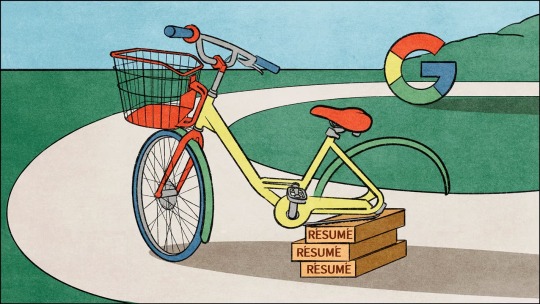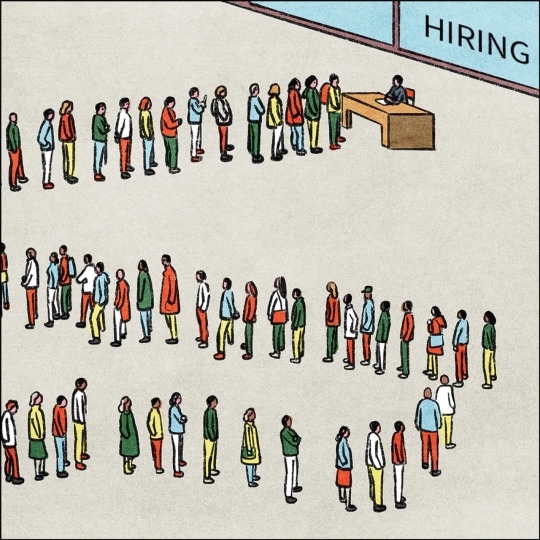#Lay Offs
Explore tagged Tumblr posts
Text

Nathan Crockett is filling his instagram feed with all sort of Michael-Scott-caliber successories.
But this one about "exit interviews"? Shane Coultor is stating the obvious:
I take it this is for all the faculty who are about to be let go? Praying that enrollment comes up soon praying
Uh oh.
4 notes
·
View notes
Text
Just so you get to know that there are alternatives to this:
Back in 2013-2014 Nintendo's President and CEO Satoru Iwata (rest in peace) cut his salary in half (along many of the other execs like Shigeru Miyamoto cutting 30& of his own salary) to avoid laying off employees at the company after the Wii U severily underperformed.
Here are some of Iwata's notable quotes from an investor Q and A: Source: Polygon
"If we reduce the number of employees for better short-term financial results, employee morale will decrease," he said. "I sincerely doubt employees who fear that they may be laid off will be able to develop software titles that could impress people around the world." "I know that some employers publicize their restructuring plan to improve their financial performance by letting a number of their employees go, but at Nintendo, employees make valuable contributions in their respective fields, so I believe that laying off a group of employees will not help to strengthen Nintendo's business in the long run."
In 2021 everyone was rightly scandalized and enraged when it was revealed that Bobby Kotick ( Activision-Blizzard's CEO and one of the biggest scumbags in the world) received a $200 million bonus after laying off around 240 employees at ABK ( Source: Yahoo News) Now your next question should be: How much money will the CEO and executives at Epic (or any other AAA studio or company doing massive lay offs this year like the Embracer Group, Electronics Arts) will receive and why are they receiving said bonuses if their mistakes have led to 830 employees being laid off.
And of course most people won't care, much like when it was revealed that there was a super toxic and chauvinistic environment in Activision Blizzard that led to many women being rampantly sexually harrased and even on of them taking her own life.
Or the severe crunch that employees at CD Project Red had to endure with Cyperpunk 2077 (even after they were promised there wasn't going to be cruel crunch like they had to endure with The Witcher 3)
As long as consumers can play their game sadly they won't care and that massively sucks! There won't be any effective change in how employees are treated at these big corporations if consumers don't vote with their wallets and advocate for the workforce's well being.
And this tweets ring true:


- The metaverse isn't worth 830 people being laid off even if it was the" next big thing", but let's be real it isn't and it won't. -This is another reminder that corporations aren't anyone's friends. -Also fuck corporations.
7 notes
·
View notes
Text
Taking a Step Back
I have been doing a lot of reflection recently, and I have come to the conclusion, that I am juggling too much. As some of you may know, I was laid off from my game development job in December when HakJak Studios was shut down suddenly. Recently, I have needed to spend more time and energy on my job search along with supporting previous game titles. This is to say, taking extra time to post about my game, make gifs, and plan feature work based on showing visual progress has been taking up a lot of time and energy I no longer have...
Don't Worry!
Part of the reason I am taking a step back is so that I can focus on the game's development! 🎮
I have a lot of plans for the game, and can't wait to show everyone the newest game features and progress when I return.
Thank you for understanding 💖
I am eager when I can make my return and post progress updates more regularly!
6 notes
·
View notes
Text
Good shit
2 notes
·
View notes
Text
You Studied Computer Science But Big Tech No Longer Wants You. Now What?
Students at the Bay Area’s best universities once dreamed of working for Apple, Google and Meta. Then the lay-offs happened
— 1843 Magazine | May 15th, 2023 | By Charlie McCann

Armed with a stack of cvs still warm from the printer, Ayara (a pseudonym) plunged into the career fair. The room was already packed with job-seekers. The second-year student wasn’t expecting much. In past years, a computer-science student at the University of California, Berkeley, could hope to emerge from this campus ritual with an interesting summer internship, possibly at a “faang” company – the acronym for Facebook (now Meta), Apple, Amazon, Netflix and Google. Ayara’s best friend had snagged an internship at Apple at a fair like this one.
But none of the faang firms was here this time. Neither were Spotify, Salesforce, Uber or Microsoft. In any case most of those companies and almost 50 others – “all the famous ones” – had already rejected her internship applications a few months earlier. And that was before the latest round of job lay-offs. There were 120,000 tech lay-offs in January and February alone; Alphabet, Google’s parent company, accounted for 10% of those lost jobs. (Meta would announce another 10,000 lay-offs shortly after the fair.) By the time the fair came round in March, Ayara had scaled back her ambitions. “Any company that will hire me is good, at this point,” she told me later.
By the time the fair came round, Ayara had drastically reduced her ambitions. “Any company that will hire me is good, at this point”
Ayara muscled her way to a crowded stall towards the back, where Juniper Networks was holding court. Founded in 1996 – long before most college students were born – Juniper is a workhorse of Silicon Valley: it makes a decent share of the hardware underpinning the internet, and software that controls that hardware. It has none of the “sparkle” (one of Ayara’s favourite words) of a faang company – its talent-acquisition manager told me that students often haven’t heard of it. Yet at this fair it had one irresistible selling point: it was still hiring interns.
Ayara caught the eye of a Juniper recruiter and they started talking. The fair was a bit like a cocktail party – the polite smiles, the hard sell – except without alcohol to quell people’s nerves. Some students were tapping their thighs or pinching the skin on their hands. Ayara put on a good show of appearing relaxed. As the recruiter scanned her résumé, she peppily described some of the highlights: interning at a subsidiary of Zipcar, a car-rental company; introducing emoji reactions within a messaging feature at PlayStation.

“Looks like you’ve worked for some big companies,” the recruiter said approvingly. “So why are you interested in Juniper? Do you know something about our company or just exploring?”
“I’m looking for a summer internship,” she said, gently dodging the question.
The recruiter, who wore a Berkeley alum badge on his t-shirt, nodded politely. He explained that a primary focus of the company is network security. “Are you interested in security?”
“Yeah,” she said tentatively, in the voice of somebody who had never considered pursuing a career as unglamorous – as unsparkly! – as security. After the fair, she submitted an application to Juniper. Weeks later, she had yet to receive a response.
It is not the ideal moment to enter the tech job market. For years the tech industry has paired huge profits with massive investments in expansion. Intoxicated by its own success during the pandemic, big tech binged on new recruits: Meta doubled its headcount over a short span. Now the good times are over. The tech giants have encountered stiffer competition (like TikTok) and tougher economic conditions, including manufacturing shortages and high interest rates. Pushed by investors to embrace unfamiliar concepts like “fiscal responsibility” and “long-term growth”, the industry has, over the past year and a half, shed some 300,000 workers, the most since the dot-com crash two decades ago. Amazon and Meta have rescinded job offers.
The effects are being felt in campuses all over the country. At Berkeley, would-be interns had formed a queue outside the career fair before its doors even opened. A few especially keen students wore suits and ties (a rare sight on campus where hoodies are de rigueur).

Even if they succeed in snagging an internship, their position is precarious. Some computer-science majors have had their internships cancelled; those with job offers have had their start dates pushed back, according to Sue Harbour, the executive director of the college career centre. They are the lucky ones. Several students told me that they had applied for jobs and internships at hundreds of companies with no offers to show for their efforts. When I introduced myself to a sophomore, who was majoring in electrical engineering and computer science, he asked, “Is The Economist hiring?” He was joking. Sort of.
More than 60 companies had set up stalls at the fair, ranging from government agencies and financial institutions to niche tech startups and, surprisingly, a spa. The biggest tech name there was sap, a European software giant. The absence of the most famous names in tech probably gave a boost to the less flashy suitors at the ball. “We get passed by a lot at this table,” a recruiter from a local public-transport agency told me; she managed to draw a smattering of enquirers. Firms that had suddenly become rock stars included Bank of America, and a startup making self-driving trucks. Students often haven’t heard of Juniper, said Benjamin Chen, a talent-acquisition manager whom I found setting up his stall, because “we work behind the scenes”. He’s often greeted by students who gamely open with, “Oh tell me about Jupiter,” Chen said, laughing.
Big tech binged on new recruits: Meta doubled their headcount over a short span. Now the good times are over
These companies have an appeal beyond simply being all that’s on offer. The quality that student job-seekers prize most in a company now is stability, according to a recent survey conducted by Handshake, a recruitment startup. Chen says he too has noticed a shift “towards a company that’s more stable and more predictable rather than something a little bit more, I guess, risky.”
This is a big adjustment in the culture of computer-science students at Berkeley. The large firms used to be imbued with an almost magical allure: no other companies were seen as worth working for. “The name is important because with the name comes recognition of your skills or your work,” Ayara told me. People say, “Oh, this person worked there.”

Some of this yearning comes from a sense of competitiveness and one-upmanship, driven by social media. Berkeley students had already gone through what one described as a “very stab-in-the-back” selection process to get on the computer-science course. Students who have secured jobs and internships crow about their success on LinkedIn, said Ayara.
The high salaries and gourmet food of the big tech firms were also part of the appeal. So are the sprawling campuses, which resemble “a playground”, said Vicky Li, a 21-year-old Berkeley graduate. Several students told me that big tech internships are far from demanding. Li has heard that interns at Google, for example, “get paid a ton” even though they work just two hours a day. (I asked Google about this and was told, “We do not accommodate part-time internships.”)
But students are now starting to wonder if they were seeing these big tech firms straight.
Li thinks she “romanticised” faang companies. She has started to see the perks they offered as gimmicks. Now she describes herself as “a little bit more anti-corporation”. She had realised she didn’t want to work in big tech before the lay-offs and is relieved she didn’t get sucked into it. She hopes to work as a product designer at a small company, ideally a startup, where she can get “solid experience rather than just chasing a bigger name”.
At the Juniper stall I met Arthur Kang, a Berkeley senior who had spurned offers from famous companies in favour of a job with a less glamorous firm this summer. Juniper offered him the opportunity to create something new rather than being a cog in the machine, he explained. His friends are puzzled by his decision, but he’s confident it was the right call. “Stability”, he told me, “includes not being fired right away.” ■
— Charlie McCann is a Features Writer for 1843 Magazine | Illustrations Klaus Kremmerz
2 notes
·
View notes
Text
I read every word. You should, too.
Friends, Musk is trying to downplay the chaos he’s creating by saying it’s much the same as the cost-cutting efforts of the Clinton administration. “What DOGE is doing is similar to Clinton/Gore Dem policies of the 1990s,” he posted on his X platform. Rubbish. I cut costs in the Clinton administration. The contrast with what Musk is doing couldn’t be sharper. As secretary of labor, I took the Department of Labor down from 18,500 employees to 16,600 — but did it without any layoffs. No chainsaws. No meat-axes. And we were careful to improve the services we were providing the public. For example, when people lost jobs in an industry that was shrinking, we devised a way to get them job-training and job-search assistance in addition to unemployment insurance. This helped move them into new jobs faster — which also saved the government over $1 billion a year in unemployment payments. We plowed that $1 billion back into job-training and job-search assistance, making the whole economy work better. In Musk’s attack on the federal workforce, thousands of federal workers have been fired without warning. Or they’ve been offered fake “deferred resignation” buyouts that were never authorized by Congress and may not be legal. Entire agencies have been gutted without legislative authorization, forcing judges to intervene. Our “Reinventing Government” effort was authorized by bipartisan congressional legislation. We worked carefully over several years to identify areas where government could be more efficient, notifying Congress of what we were doing. But the Republicans who control Congress today have allowed Musk to race ahead without them, even though the Constitution states that the legislative branch approves spending and federal law prohibits the president from cutting programs Congress has authorized without its permission. Clinton sought that permission, and Congress accepted $3.6 billion in cuts he proposed. We also involved federal workers, because they knew better than anyone what could be improved and how best to do it. We introduced performance standards, we encouraged our workers to embrace the internet, and we gave out awards to employees who came up with ways to cut red tape and improve service. “There was a tremendous effort put into understanding what should happen and what should change,” said Max Stier, president of the Partnership for Public Service, which seeks to improve the federal workforce. “What is happening now is actually taking us backwards.” We were deliberative and careful. Musk is the opposite. Musk sees government workers as the enemy — as costs to be cut. We saw government workers as assets to be developed, our partners in getting better services to the public more efficiently. Musk also calls people who benefit from government programs the “parasite class.” Presumably that’s why he’s eager to cut back Medicaid. But Medicaid’s beneficiaries aren’t parasites. Half of them are children. Oh, but if we’re talking about people who depend on government, Musk is the biggest “parasite” of all. Over the years, Musk and his businesses have received at least $38 billion in government contracts, loans, subsidies, and tax credits, often at critical moments, helping seed the growth that has made him the richest person in the world. That he views public servants as his enemy and the people who benefit from public programs as “parasites” tells you all you need to know about Elon Musk. When you hear Musk say his effort is similar to what I and others did in the 1990s, know he’s lying. When you see him call people who benefit from public programs “parasites,” know he’s a hypocrite. Thoughts?
#musk#lay offs#destroying my country#disrespecting the Constitution#do the right thing#get rid of musk#get rid of the current administration#now#save democracy#save Constitutional rights#musk is a parasite#freedom#liberty#justice for all#unalienable Rights#these mean a lot to me#fight for my country#protect our country#protect our people#protect our rights#protect everyone#speak LOUDLY#we the people can fix this#let's start now#together we are stronger#together is the key#let's take our country back now#hold them accountable#follow the rules#checks and balances
5K notes
·
View notes
Text
In case you were wondering why Spotify Wrapped sucks balls this year, and more importantly doesn't have any genre data:


Can you hear the sound of bells? That's because they're clowns. 🤡 🛎
#This is embarrassing. Shame on them.#Laying off workers and discovering you can't just do their work without them.#Clowns fr.#Spotify wrapped#Spotify
91K notes
·
View notes
Text
Layoffs in China
youtube
#China#India#Chinese#Indian#Indians#Beijing#Hongkong#Mainland china#Chinese national#Chinese citizen#Layoff#Laid off#Lay offs#Protest#Strike#Rally#Factory#Job#Jobs#Worker#Working#Asian#Asians#Company#Youtube
0 notes
Text
My god, there's a second list of probationary employees due to be let go that didn't get put on the list the first time

#I'm having fun with it#this is so stupid lol#government#lay off#lay offs#trump#elon#this is for the BOR for now#I'm sure other agencies will have a 2nd list as well
1 note
·
View note
Text
Paramount Global to lay off 15% of its US workforce
Paramount Global to lay off 15% of its US workforce
The merger / takeover may be happening, but (as Deadline reports) there’s sadly no surprise as Paramount Global is to layoff 15% of its US workforce before the end of 2024. Co-CEO Chris McCarthy confirmed the news in the second-quarter earnings call. McCarthy said marketing and communications would be one of two areas to be targeted in the reductions. The other will be support functions…
0 notes
Text

My heart is with the 830 people who lost their jobs at Epic Games. Standing in solidarity with 'em.
Fuck Tim Sweeney
Fuck the metaverse
6 notes
·
View notes
Text

The Afton’s different ways of parenting in FNAF
#myart#chloesimagination#comic#fnaf#five nights at freddy's#fnaf fanart#michael afton#mrs afton#william afton#fnaf 4#afton family#The difference between William and Mrs Afton#I wanna believe Michael was closer to his mom#or at the very least she was way kinder to him#William is quick to putting down Michael to act right#it’s embarrassing to him for Michael to not just stay in line#ruins his idea of being a perfect family and lay low#while Mrs Afton sees clear her son is just being a kid#that he as probably trying to defend himself#and she wouldn’t want him to get into more fights of course#but won’t bring him down too much especially when William is the way he is#she would clean off his wounds and bandage him up#I like to think Michael got his humor from his mother
7K notes
·
View notes
Text
12/06/2024 - VR Chat laid off 30% of their staff, about 50 people. This comes after an announcement that price increases for VRChat Plus and VRChat Credits for European nations will be instated (Notably, prices are not increasing on FaceBook's platform). As Scott Hayden notes, "Granted, Steam user data doesn’t tell the whole picture... however Steam data suggests VRChat isn’t falling out of favor, rather experiencing less exponential growth than seemingly expected." This all comes after the 2021 80 million USD funding round from Anthos Capital (etc.), to create a digital economy. While the lay offs are accredited to the company's mass amount of individual contributors no longer being tenable, ultimately, nothing the company has done has proven them competent in anything other than developing a trap. I'll leave this post off w/ a segment from GiovanH's excellent write up on VRChat's "user" economy, as I think it explains a lot about these lay offs and the overall zeitgeist of neoliberal capital's entrapment schemes.

0 notes
Text

#i made this specifically about Duolingo because it pisses me off#me when i lay off a large amount of staff in favor of shitty ai but it's okay because i make funny tiktoks (i am a soulless corporation)#companies using shit like asmr or “girlies” in unmarked ads on social media#I hateeee you i hate you i hate you#every part of amusement had turned into advertisement#the legend of zelda#loz#tloz#ganondorf#good advice ganondorf#good advice
6K notes
·
View notes
Text
McKinsey: The Group Secretly Running Every Company (And Government?)
youtube
#mckinsey#consulting#consultations#capitalism#economics#government#healthcare#corporations#neoliberalism#work#lay offs#Youtube
1 note
·
View note
Text
Musical prodigy Steve, who is way too casual about this gift. He plays seven instruments and could read sheet music before he could spell his own name, and literally never mentions it.
He has perfect pitch and can perfectly replicate a song he’s heard once on the radio. If you gave him an instrument he’s never played before and an hour, he’d made something beautiful out of it. And no one knows.
Well, some people know.
His mom still signs him up for recitals and performances out of state, but Steve never talks about it. He just says he has something to do with him mom that weekend, and then goes to preform in a concert hall in front of hundreds of people.
Honestly, Steve kinda assumed everybody was like that.
His parents never made it seem like it was a big deal. Hell, he doesn’t even consider that he could go to college for music (not that his dad would ever allow it). It’s basically a hobby.
It’s only after concussion number two when he’s sitting in English class listening to Eddie Munson complaining for a week straight about how he has an ‘epic vision’ for a ‘new song’ but it’ll never come to fruition because he’d need a full string orchestra.
And then another week listening to him hum the melody of the song.
And then a couple more days with the studio equipment that his parents got him for Christmas that Steve starts to think that maybe this ability isn’t all that common.
Eddie - still complaining - just stares at him with shock and confusion when Steve sits a cassette down in front of him and tells him to, “Stop talking.”
Honestly, that should be it, right? Steve has spent more effort making mix tapes than that cassette and those were barely a blip in the week so…
So, why is Eddie Munson confronting him at his locker the next morning? Eddie’s hands are all over the place like, “Did you really find and pay an entire orchestra to play my music just so I’d be quiet?”
“No,” Steve says slowly because that’s insane. “I played your music so you’d be quiet… it clearly didn’t work.”
“You can play…”
“Yeah?”
Eddie just stares at him like he’s something worth staring at and then asks seriously, “Do you want to be in my band?”
#Robin overhearing this conversation: ??#Steve turning to her: Hey you play the trumpet right? you’re off key#Nancy despite having been to his house has no idea Steve is musically gifted at all#Tommy on the other hand knows just how talented he is and misses laying on the floor while Steve practiced for recitals and listened#Tommy hears Steve mentioned that he got asked to be in a band to Jonathan Byers and is pissed for the rest of the day about the possibility#of having to go the Hideout and hear Eddie Munson’s shitty band just to see Steve preform again#steve harrington#eddie munson
2K notes
·
View notes